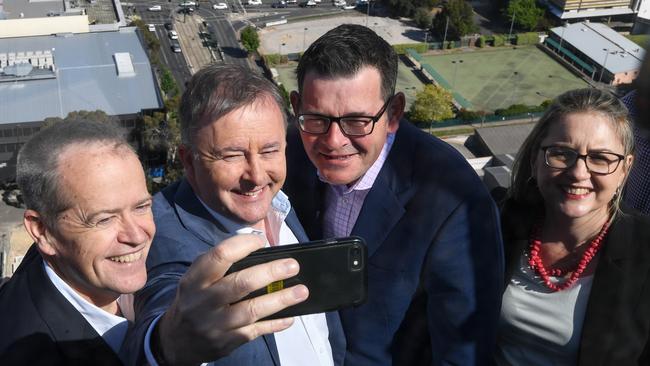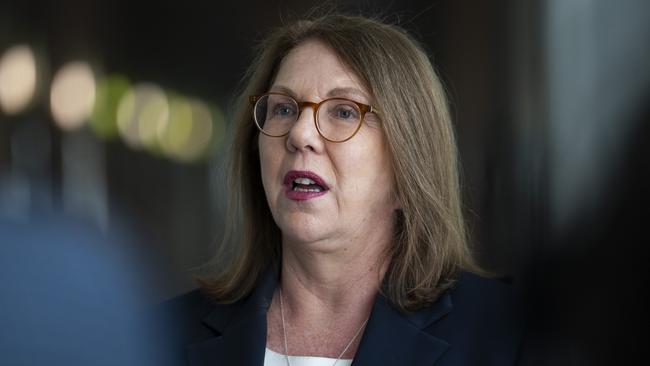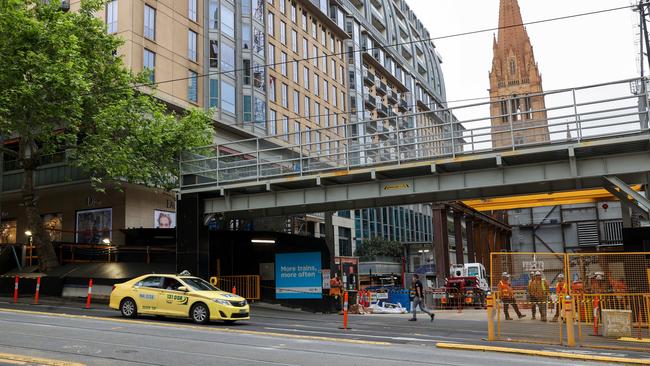Suburban Rail Loop exempt from Anthony Albanese’s infrastructure review
Business groups and economists have nominated Victoria’s Suburban Rail Loop as the development that should be axed by the federal government as it attempts to control inflation.

Business groups and economists have nominated Victoria’s Suburban Rail Loop as the development that should be axed by the federal government as it attempts to control inflation – but former premier Dan Andrews’ pet project is safe from the chopping block as it has been exempt from Anthony Albanese’s infrastructure review.
The push to reconsider the SRL came as Queensland Deputy Premier Steven Miles warned federal Labor it would fail to pick up seats in the key state in the next election if it axed funding for infrastructure, while Tasmania and Western Australia joined the growing opposition to cuts or delays to projects.
Australian Industry Group chief executive Innes Willox said the government was right to review the infrastructure pipeline but it “must now follow through to ensure projects that go ahead are feasible, viable and have a clear national benefit”.
“The time for state-created and uncosted boondoggles, like Victoria’s proposed Suburban Rail Loop, is over,” Mr Willox said.
The Albanese government committed $2.2bn to the first stage of the SRL in the October 2022 budget, with the promised funding coming before Infrastructure Australia had received a business case for the project from the Victorian government.
The Andrews government estimated the first of the SRL’s three proposed stages would cost $35bn, and has banked on the commonwealth footing a third of this projected bill.
Victoria’s independent parliamentary budget watchdog has said building and operating two of the project’s three stages could cost $200bn by 2085.
The government has exempted election commitments or under construction projects from being subjected to the infrastructure review, making the SRL safe given it was promised ahead of the 2022 poll.
Infrastructure Minister Catherine King on Monday said the yet-to-be released infrastructure review had looked at 250 projects and found at least $33bn in cost overruns. She said there would be changes to the rollout of funding but the 10-year pipeline would remain at the level the government committed to at the election, of $120bn.

Mr Miles on Monday said there would be serious political implications for the Albanese government if it axed projects in Queensland.
“The Bruce Highway runs through every single seat that federal Labor needs to win and failed to win last time,” he said.
“It literally runs from Longman to Leichhardt, and that’s the political danger if their intention is to cut these projects.”
He said he initially supported the infrastructure review to “address pork barrelling” by the previous Coalition government in Victoria and NSW, but was now concerned that Queensland projects were on the chopping block.
“We agreed with them at that time … then they said that the review was going even further and it was designed to address the sustainability of the budget. Well, now the budget is in surplus,” he said. “Now at this late point, we hear that the infrastructure review is actually about addressing inflation. With Queensland growing as rapidly as it is and with the Australian government’s decision to let in a record number of migrants to our state, all of the infrastructure we have planned is necessary.”
West Australian Treasurer Rita Saffioti said with construction costs moderating “we don’t support any major changes to our pipeline of projects”.
Tasmanian Deputy Premier Michael Ferguson said Jim Chalmers was paving the way for infrastructure cuts “purely to fix his financial problems while blaming it on inflation”.
“The Reserve Bank of Australia has clearly stated in recent months that goods price inflation has eased, but the price of services continue to rise, putting upward pressure on inflation,” he said.

NSW is also pushing back against cuts to its pipeline. Grattan Institute director Marion Terrill identified projects that were election commitments or already under construction as worthy candidates to be reviewed, including the Inland Rail, SRL, and the Western Sydney airport component of the Sydney Metro. “If a project cost has blown out by a lot, and the feds are up for more than expected, then that could be a candidate for significant slowing down or cancelling,” she said.
KPMG chief economist Brendan Rynne said there was “absolutely no doubt” that the hundreds of billions in infrastructure work was driving inflation higher, particularly in the residential building sector. He said net migration could reach 580,000 through this year, requiring a careful appraisal of the infrastructure pipeline.
“If you run behind on some of these infrastructure projects, then you can reduce peoples’ quality of life,” he said.
“The issue here is critically assessing each of the projects in terms of their contribution to improving societal or community outcomes.
“It’s one thing to have a cost-benefit evaluation; it’s another to reassess projects on a league table basis if we are wanting to schedule our projects to minimise inflation. It’s still going to be subjective, but it’s not an overly difficult thing to do.”
The value of total work under construction has soared since the pandemic lockdowns, from $225bn in late 2020 to $390bn, with three quarters of that $165bn increase due to public infrastructure projects, according to Deloitte Access Economics.
Additional reporting: Paige Taylor, Matthew Denholm


